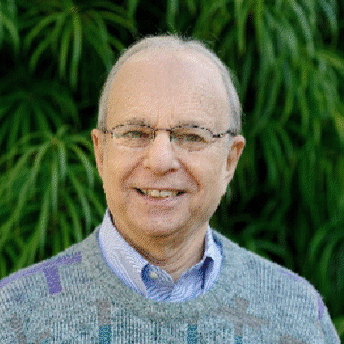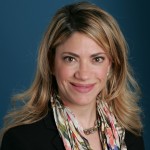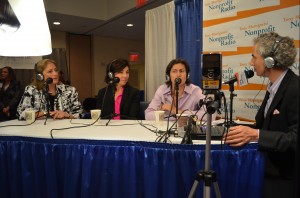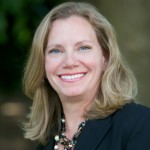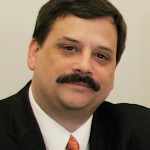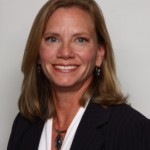Big Nonprofit Ideas for the Other 95%
- On Friday at 1pm: Talking Alternative Radio, Fridays, 1-2PM Eastern
- Archive: Subscribe on iTunes and listen anytime, anyplace on the device of your choice.
Tony’s Guest:

Professor Emeritus at Rochester Institute of Technology, Dr. Fram is author of “Policy vs. Paper Clips,” introducing nonprofits to a corporate model of board governance to cut out the minutia from agendas so your board can focus where it should, on policy and planning.
Top Trends. Sound Advice. Lively Conversation.
You’re on the air and on target as I delve into the big issues facing your nonprofit—and your career.
If you have big dreams but an average budget, tune in to Tony Martignetti Nonprofit Radio.
I interview the best in the business on every topic from board relations, fundraising, social media and compliance, to technology, accounting, volunteer management, finance, marketing and beyond. Always with you in mind.
When and where: Talking Alternative Radio, Fridays, 1-2PM Eastern
Here is a link to the audio for this episode: 139: A Conversation With Eugene Fram. You can also subscribe on iTunes to get the podcast automatically
View Full TranscriptProcessed on: 2018-11-11T22:57:44.881Z
S3 bucket containing transcription results: transcript.results
Link to bucket: s3.console.aws.amazon.com/s3/buckets/transcript.results
Path to JSON: 2013…04…139_tony_martignetti_nonprofit_radio_20130426.mp3.951957012.json
Path to text: transcripts/2013/04/139_tony_martignetti_nonprofit_radio_20130426.txt
Hello and welcome to tony martignetti non-profit radio big non-profit ideas for the other ninety five percent for april twenty six twenty thirteen i’m your aptly named host question have you raided and reviewed the show? I haven’t asked for for many weeks, and if you haven’t done that, i’d be grateful if you did. We increase the ratings and reviews on itunes considerably the last time i asked, and if you haven’t, i’d be grateful if you did if you wouldn’t go over to non-profit radio dot net, start there and click readings and reviews and then give the show one to five stars, hopefully five and an a rating. I’d be grateful for that. Thank you very much. Oh, i hope you were with me last week. I’d suffer acute respiratory distress if it came to my attention that you had missed a conversation with amy. Sample ward part do she’s, our social media contributor and co author of social change. Anytime. Everywhere we talked about your multi-channel plan fund-raising calendar, staffing and budgeting and now you know what a home page hijack is this week. A conversation with you, jean fran lots of conversations professor emeritus at rochester institute of technology dr fram is author of policy versus paper clips introducing non-profits to a corporate model of board governance to cut out the minutia from agendas so your board can focus where it should on policy and planning roughly thirty two minutes into the hour on tony’s, take two ah that’s, a little bit of a toughie because i’m recording this about three weeks in advance, and i don’t know what’s going to be on my block, but i’ll share some gratitude on tony’s. Take two my pleasure now to welcome eugene fran he is professor emeritus at rochester institute of technology he’s, a consultant, board chair and volunteer director for non-profits he has authored a co or co authored more than hundred twenty five journal articles on marketing and non-profit and corporate governance, he wrote the book policy versus paper clips, which you can find on amazon to introduce a governance model that we’re going to talk about on twitter he’s at eugene fram four a m just like the oil filter eugene fran, welcome, welcome good morning to you. Good morning to you, it’s it’s morning in california on the day that we’re recording very early morning. So thank you for joining me this early from the left coast. It’s. My pleasure, jean. Are you are you part of the fram filter family, buddy? Chance. Unfortunately, i am not. You’re not those things still around. I don’t own a car. I haven’t had a car for years. We are fram oil filters still around. Do you know why? I think they’re still on the web. I seen them. Okay, you have but that’s, not you. I’m sorry. And that’s not me. That’s. Alright. I’m not part of the great martignetti liquor family in boston and new england either. So okay. The both of us are suffering from famous names and chronic under representation in the in those wealthy families. Yes, we’ve been born with huge handicaps. I’m still trying to overcome mind. I hope you have overcome your one hundred twenty five articles. Yeah, somewhat. But you know, my ambition is to go to a thousand. Okay, well, now that you’re in retirement, you have more time for that. But yes. That’s true. Professor emeritus jean what? What’s what’s happening with boards? Why? Why do you feel they are missing the mark? Well, boards from a governance point of view non-profit boards from the government’s point of view, frequently have retained the old nineteenth or twentieth century model off of governance, where the board has a multitude of committees and tries to eventually micromanage the uh uh, the staff in the process, nothing gets done or the organization, although it has potential as stunted growth. Ah, if it in that way, because volunteers like myself and again as i talk, i’m not talking as a non ah non-profit ceo or e d i’m talking as a volunteer director, we can’t be there day today, and we can’t, uh, manage the minutia that is no, are they not necessarily monisha or the work that really needs to be done and we can’t really manage truly professional staff, we can help. We can advise we can help. We have an obligation to set policy, but uh, but we’re simply, uh, part timers or some person has described that we’re birds of flight through the through the organization because we’re they’re traditionally three to six years, and the staff stays and works and works under different boards. Your concern is that despite the well meaning board on dh and individual members having great potential and the best interests of the organization heart you feel they’re actually through these old models stunting the organization? Absolutely. And i think it could be proven when you look at any number of organizations which has suffered this way. Do you want to give an example or to, uh well, i’ve consulted with a number of them on, but i don’t want yeah, i’ll talk t o generalities specific organizations where the the the board actually got ah, where the volunteers on the board actually got involved to the level that they were, uh, they were managing departments. Eso if the decision had to be made, the department had first went to the volunteer uh uh, advisor or whatever they call him at the time and then went to the d with the advisers either decision or concern or whatever the department had won it. So the organization didn’t grow until they finally change. They finally changed the model full time employees reporting to a parttime volunteer argast person. Exactly. Oh, my all right. Let’s, let’s. Start with the beginning of the process and we will get to the corporate model that you lay out in your book way. We’ll get to that let’s. Take a couple of discreet sort of time line points and along a board members life cycle with the organization and i’d like to start with recruitment. Makes sense, i think. Xero what can we what can we improve around our board? Recruitment? Well, the chief executive officer where, whether they be a nadie or a president ceo, as i suggest, needs to have more contact with the board with the individual board members. I think they they have tto have more contact between meetings that has to be in often and formal. Ah, and they have tio they need to get to know each other. And i suggest, uh, that they actually made quarterly to informally discuss the concerns and the challenges. Ah, that the chief executive officer is facing. I, uh there are various techniques for doing this. I recently read in the harvard business review. Uh, a recommendation. Uh, that the, uh uh uh, we’re one, uh uh, for-profit ceo actually sends a email out to the board every sunday morning. Uh, just laying out very briefly, uh, in this case, his concerns about what’s going. On in the organization and what new ideas? He has a c as he indicated in the article, he says, i don’t worry about grammar right now, gina, i’m trying to focus on recruitment, so maybe maybe in in in this board meeting is often as you’re suggesting they’re identifying gaps in the board, and maybe they can try to fill those gaps with new board members that’s, right? Ok, and but as they’re going through that recruiting process to identifying skills that they need that the board is lacking, how should they be talking to potential board members? Well, they should talk to board members that what they do is to value their contributions of time, the most important thing, and they make ah, meaningful use off the board members time they don’t ask the boardmember the potential boardmember to do frivolous things, uh, such as stuff envelopes or our or get involved with watching slide shows or commenting on slide shows as one. Now that i’ve heard of s so that they focus on, they focus on the policy in the strategic issues of the organization. Okay, we’re going to take a break now, jean and when we return. We’ll keep talking about the little about the life cycle of the boardmember. And then we’ll get into the corporate model that you lay out in policy versus paper clips. So thank you, gene is going to stay with us. And i hope you do, too. Talking alternative radio twenty four hours a day. Are you confused about which died it’s, right for you? Are you tired of being tired? How about improving your energy strength and appearance? How i’m rika keck, holistic nutrition and wellness consultant? If you have answered yes to any of my questions, contact me now at n y integrated health dot com, or it’s. Six for six to eight, five, eight five eight eight initiate change and transform your life. Are you concerned about the future of your business for career? Would you like it all to just be better? Well, the way to do that is to better communication, and the best way to do that is training from the team at improving communications. This is larry sharp, host of the ivory tower radio program and director at improving communications. Does your office need better leadership, customer service sales, or maybe better writing, are speaking skills? Could they be better at dealing with confrontation conflicts, touchy subjects all are covered here at improving communications. If you’re in the new york city area, stop by one of our public classes, or get your human resource is in touch with us. The website is improving communications, dot com, that’s, improving communications, dot com, improve your professional environment, be more effective, be happier, and make more money improving communications. That’s. The answer. Hey, all you crazy listeners looking to boost your business? Why not advertise on talking alternative with very reasonable rates? Interested simply email at info at talking alternative dot com metoo welcome back with jean fran, and we’re talking about policy versus paper clips and focusing your board where the attention, where its attention ought to be on policy and planning and things like that. So jean question about in the recruitment process, the expectations around time and fund-raising for potential board members were still now just talking about the potential member what should, what should a non-profit be revealing about time and fund-raising well, they first ought to be very clear about the time commitment expected, and they ought to delve into a deep discussion with the boardmember on this because i’ve just consulted with a organization that has recruited cem very fine people who are working on people who are building their careers, and they lay out the they discuss the the time commitment for the organisation, but in the final analysis, after being on the board for three to six months of the people have, uh, huge work commitments, and they say, j i just can’t i made the time commitments. Oh, and so they had to restructure the board in a way that allows the chairman much more responsibility, i think, than a board chair should have. And what about the fund-raising expectations? Well, not all board members will enjoy fund-raising i think it’s necessary to find those who might enjoy it or have experience with it to make some commitment to it on dh. Do you want to see that as a dollar amount or more flexible based on the individual based on what the individual strengths are, if they have contacts? That’s one thing, uh, if if they have aa dollars to give or you are in the are able teo network with people of substantial wealth, that is another thing. Okay, but there ought to be. Do you agree with this one hundred percent participation personal at some level for for all board members? Yes. That’s necessary? Because foundations, when you go for grants often look at that as a board commitment, showing board commitment that they have made the financial commitment to the organization. Should these expectations be in writing for the potential boardmember? I think so. But i think it depends upon the culture of the board and they understandings that air developed at the beginning. If you, uh, if they, uh, if the board gets a lot of questions after after being on the board for a while about those commitments, maybe it’s necessary to put it in into writing, but not necessarily a legally binding contract. Oh, no, no, no, no. Okay, but just something that here’s what we’re expecting and please, you know, indicate that you’ve reviewed it. So we’re all have well have consistent expectations, right? We’re all on the same page, okay? Eso then moving. Teo orientation. If you recruited the right people, what should board orientation look like? Well, orientation, uh, should take place. I would say over i again size and complexity of the board about a six month period, andi, in the sense that there might be a half day or a couple our orientation about the organization and its mission is a mission, vision and values. Oh, and any other details that they they have to be concerned with. But then other issues ought to be ah brought up for the new board members as they as they progress through their first six months during this period, the, uh, the board chair and the ceo i need to be readily available to answer questions from from the new board members s o that they become fully apprised of the issues as they go along a two day board, uh, section in which a lot of information is thrown at the person, uh, simply doesn’t stick its a matter of repetition, understanding and going through the process themselves. And as you know, we all learned best when the when the problems are immediately in front of us. Ah, for example, uh, with board liabilities, a lot of boards will bring in a lawyer and and lay out the potential liabilities for a boardmember in their particular situation. Uh, they hear a lot about the laws, but they if you’re not a lawyer, they frequently forget it. Uh, so when an issue comes up ah, that the that there might be a a personal liability in in the situation, it’s up to the ceo and the board chair to remind the new people and refresh the older people that this particular situation might be affected by this particular legal precedent. Would you put new board members on a committee right away? Or would you keep them at large? I would keep, um, at large unless they have a strong desire to go on a committee. And of course, a sze yu know. I suggest that there are really only three committees needed. Yeah, on this is a way of getting into the corporate model. What are those three committees? Well, first that’s. Very simple. You have a planning and resource committee. Ah, that looks forward. It looks towards the strategic plan. It looks towards the resources that i have both, uh, human resource is and financial resource is it looks forward to the planning that is, that is necessary. It also has a special responsibility that the other committees don’t have and that is to, uh, teo ah, monitor and mentor ad hoc committees. Any man as, uh, special issues come up of a strategic or policy nature ad hoc committee need to be formed for that particular issue clearly, because because we don’t, we only have three standing committee, so we’re going to get it right. We’re gonna need ad hoc committee, particularly everything ascot committed to take care of the issues. They come up, come up esso and then that’s is that their their their responsibility. On the other side of the picture is the assessment committee and the assessment committee simply assesses how we have done. Okay on that includes the oddity function and the er in states such as california, where you need a separate audit committee. A subcommittee of that assessment committee performs the audit function, meets with the auditors. This all seeds up to the to the executive committee. The third committee, which has the traditional executive committee duties of of ah, of acting for the board and emergency situations and taking a final review off the various reports that air coming through before they come to the board. So it’ll give you, say, have a board of twenty one people with seven on each. Ah, you will find that, uh uh, by the time it gets to the board, uh, through the process is the large part or nearly all the board are familiar with the issues they may disagree with with some of the proposals and have other ideas at the board meeting. But everybody is full of pretty much everybody is wholly informed. You say twenty one board members as an example. So this is cannes. This corporate model worked for organizations that have just maybe half a dozen boardmember xero their way. We could divide. That in four or however we want to arrange that, depending upon the needs of the corporations of the non-profit, uh, this is a flexible model, okay? And people have used it in different ways. Ah, and, uh, for example, i once met a person, a new organization that didn’t have any standing committees. All committees of the board were ad hoc committees reporting to the entire board. They were happy with it. I would have been happy with it, but evidently it worked. It worked for them. All right. So there’s flexibility is this more what we see in corporations and you have to you have to help me out because i don’t. I’m not familiar with the corporate model. Is. Is this more typical of the way corporate boards operate? Very few standing committees, maybe not exactly the same, but very few standing committees. Lots of ad hoc committee’s. Well, this is being ah proposed by the bye. Some major consultants now, as you as you noted in the book, however, i hate to say, but i’ve been at this for more decades, uh, than i care to admit. And in turn, uh, there are a cz faras. I know, based on the sales of the first two books there, which was the first to additions, which were their sales of over ten thousand copies, i would estimate the thousands of boards have adopted it on dh. However, it is still controversial among some boards and its best used with boards who have, uh, a about a million dollar budgets and roughly let’s, say about, uh, no over ten to twelve, fourteen full time employees. Uh, when it comes to the nation type of non-profit board uh, the i think the traditional model of bored involvement in operations is necessary because, uh, they’re simply not the man power to get it done. The basic problem in the process in the change is that boards begin with board involvement in operations and when they grow, they still sick with the old model stunting the growth of the organization, frustrating the chief executive office operations officer and on dh missing huge opportunities that they could have right in their growth. Gene, i’m not clear on, but i’m not clear on something. Is your recommendation for smaller organizations teo to stick with a more traditional, smaller younger organizations? I guess yes. More traditional sport model. If you have an organization with a budget, for instance, i know one that i’ve been very close to, uh, it has only has a budget and does great work. Charitable work have two hundred fifty thousand dollars a year in that case, uh uh, i would stick with the traditional oer organization, however, uh, in the book. Hey, hey. Still need tohave on audit committee of some sort. And the book describes what there’s a nest starita have that, you know, once or twice a year a cz the accounting issues and financial issues come up. And of course, the corporate model is important to have in mind as the organization grows exactly that’s the transition that they were going in. I’m just saying that’s, the transition that your urine compensation and allows you, teo, to grow two very large uh uh to a very large organization, if you want to go in that direction and it’s sort of mandated once you get a larger number of poise and, uh and, uh and larger finances to handle, if you’re in the area of over a million, if you’re in the area of one point five two, three, four, five, six million so full. I had one client a couple years ago that still had the old model on dh. They had a budget of six million dollars and, uh, the chief executive officer said to may look, i could be running away with this board, you know, they’re just not had supporting me in the way they should be supporting me there, worrying about the details of the operational details that they hear about now. That’s the policy versus paper clips. Yeah. And just there worrying about hypothetically the paper clips just to remind listeners that gene fram is professor emeritus at rochester institute of technology and the author of that book policy versus paper clips. Jean what? What can we expect? Aside from maximizing our growth potential? Sounds like more efficient operations. Um what? What else? Khun kayman organization expect if they adopt this corporate model of board governance. All right, well, uh, one is the the board members feel that they’re doing meaningful things. They think they see that there proposing projects. They’re monitoring their development. Uh, they’re getting to know the staff. Eso if the succession issue comes up, they know who. Uh, who? Ah, who the, uh, prime candidates might be, and they become really maur involved with the organization, as i indicated in policy versus paper clips. Ah, the ideal organization is a partnership between the board, the management group and the staff. They are all working together, there’s communications there, ideally and on. And they’re all focusing on the objective of meeting the needs and the grow, often the growing needs of the clients. Okay, we just have about a minute and a half or so before the break. What about employees who are accustomed to going to board members with with problems that assume that’s gotta stop? Yes, that has to stop that’s what they refer to it is the end run in the non profit organization. So the end runs have to stop, and they and everybody has to understand that it has to stop hyre so that people are not. People are not reporting to board members, they’re reporting to they’re they’re they’re supervisor or maybe it’s the ceo and president. But yes, but we can’t be going to board members for everyday problems. No, we can’t pay, uh, salary levels, uh, problems with promotions and so forth and so on. That’s particularly difficult and smaller community and smaller communities, e-giving where many of the employees might know, the, uh, the board members personally, you know, so that becomes important. So there is a transition period, uh, which can take anywhere from two to three, maybe even four years while this adjustment takes place. Okay, jean jean, we have to take a break. We’ll have plenty of time or to talk after this. After we go away for a couple minutes, i’ll come back, tony’s, take two, and we’ll keep talking to jean frame about the corporate model. Stay with me. I didn’t think that shooting getting ding, ding, ding, ding, you’re listening to the talking alternative network, get him. E-giving duitz are you suffering from aches and pains? Has traditional medicine let you down? Are you tired of taking toxic medications, then come to the double diamond wellness center and learn how our natural methods can help you to hell? Call us now at to one to seven to one eight, one eight three that’s to one to seven to one eight one eight three or find us on the web at www dot double diamond wellness dot com way look forward to serving you. Hi, i’m ostomel role, and i’m sloan wainwright, where the host of the new thursday morning show the music power hour. Eleven a m. We’re gonna have fun. Shine the light on all aspects of music and its limitless healing possibilities. We’re going invite artists to share their songs and play live will be listening and talking about great music from yesterday to today, so you’re invited to share in our musical conversation. Your ears will be delighted with the sound of music and their voices. Join austin and sloan live thursdays at eleven a. M on talking alternative dot com. Dafs you’re listening to the talking alternative network. Yeah. Schnoll i’m christine cronin, president of n y charities dot orc. You’re listening to tony martignetti non-profit radio big non-profit ideas for the other ninety five percent. Oh! Hello, i’m sorry, i can’t send live listener love this week as i’m not live, but you know that i’m grateful for the live listeners out there so lots of love to those in the us and throughout the world we get routinely get listeners from china, taiwan, japan recently ah, the uk, england and ireland of checked in so grateful for wherever you are live listener love and that’s really ah tony’s take to you know i want to thank you for listening to the show and supporting the show. I produce it for you because you’re working in or volunteering for a small or midsize non-profit a charity that’s doing great work that you’re passionate about either is an employee or volunteer and you know, it’s it’s personal i’m saying to you, thank you very much. Thank you for listening and supporting the show, and i’m very glad that you’re with me, maybe through social media, all the places that i am in social media if we’re connected there to thank you for that as well. I am grateful for your support and that’s tony’s take two for friday, the twenty sixth of april seventeenth show of the year gene let’s. Keep talking. Okay, what about you? Mentioned just briefly. Let’s. Talk a little about assessing the work of the of the ceo. Who does? Does that fall under in this corporate model? Well, that’s the, uh, that’s the assessment committee makes sense. Ideally, the assessment committee looks at, uh, two aspects of the of the ceos work and the organizations outcomes. You don’t look for processes. You look for outcomes and these khun b those, uh, those data, which are what we might call ha ha ah, hard data and that’s the data that you have with accounting records, records of membership, what a number of clients, things of that nature that you can easily major. And then there, there qualitative ah, measures that you can measure has should make sure which most or many organizations don’t major, for instance, impact on the community or or excuse me image. Ah, in the community, things of that nature more qualitative. And in that area, i suggest that you do what we call, uh uh, use in perfect metrics. In fact, i have an article out on it. And i’m sure if any of you ah, if you take a look at my website. You will. You will see it there or if you even put it on in under my name, you will find it is available on on the web on. And that is a process that i suggest with the co author, that if you use in perfect metrics over time that you khun dr process dr provoc progress and develop exchange it develop change. Excuse me, jean’s blogged itt’s a little little lengthy. So i’m going to suggest that the easiest way to find gina’s teo, do a google search on eugene fram. Yes, thank you very much. I have now have ah ah. In fact, i have an anniversary right now. I’ve just put out my hundred fifty fiftieth blawg a titled what non-profits ceos think of their boards? Other recent ones air program reductions are mandated. What can a non-profit d’oh okay, another one just for example, is management knows all what does a what’s a non-profit director to dio okay, people find you. Really? I think easiest through google search now, this years have put my name into google and there there’s a lot. A lot of links there for you this use ofhim. Perfect data. Gene, won’t you say a little more about that? Doesn’t doesn’t sound like something we’d want to rely on. Well, if your process is good and you sample reasonably well, you get data. That is not exact, but you get a feel for it. Uh, for, for example, uh, i once, uh, have was on the board of a of a charitable non-profit that was targeted, uh, to counsel. Ah. P ah, various people in the community was heavily supported by the united way. And we weren’t getting many. Ah, ah, uh uh. We weren’t getting many respondents from the inner city, so i suggest it as the boardmember uh, that i, uh, talk with some of the people in the community. What, that time no one was the settlement houses and ah, and see in the inner city, uh, which were community centers, which is a better word for them. And see what they perceived is the problem. Esso i went to them and i found out what i what they thought were the problems. And now you’re only talking to three people, but they knew the communities there and the, uh, the first thing. That happened was the aids of the community centers called, uh ah, my, uh my president and ceo and said, guess what in one of your board members coming down to talk to me? So i, uh and he said, yeah, i know. And we had agreed to this prior to that. And so i listen to these people. I came back, i gave him feedback hey made changes to try to, uh, garner a greater proportion of the clientele from the inner city. And then after a year, uh, went back and talked to the people and i said, as are many changes and they said yes, there’s been modest changes, but there’s still more that needs to be done. I fed this back to the present ceo, he made changes. And then at the end of the second year, there were there were substantial changes, and the board got out of the business of evaluation at that point. All right, so buy some buy some key interviews of the right people, right? Yeah, we don’t have statistical significance and exactly, but on everything that surrounds proper, peer reviewed research. But who can afford to do all that all the time exactly. And and the article contains practical examples. Were both myself and my co author, jerry tally, a sociologist who both of us have been in ah, an end quote in the business a long time have have used the model and have found it very, very helpful. And over time, if you repeat this, asai did and and the example i gave you it was only a about a two year run until the things started to turn around and then the ceo was evaluated on on ongoing from there you mentioned earlier something i wantto spend a little more time with the proper title. Your recommendation for title. For the the chief of the of the organization, you feel pretty strongly that executive director is not sufficient. No, uh, executive director can mean various things because it’s, used in a in a in a wide variety of ways on executive director can be a volunteer who manages the budget of a small church uh uh with a let’s say, a two hundred thousand dollars budget. An executive director khun b, for instance, one i’ve encountered recently. Ah, was the it was the head of a ten. Million dollars ah, charitable organization with over one hundred employees. And i don’t think, uh, the title executive director in the twenty first century, even in the last part of the twentieth century, gives, uh, the chief executive officer of a non-profit the position and stature that that, uh, that he or she needs toe work effectively. So what do you prefer to see? I prefer once you get into the, uh uh, make the make the transition. I prefer president and ceo because people understand their what that means, it’s clear that that person has responsibility for operations except those decisions that have to be made by the board. And that title may have significance for board members also that they recognize the responsibilities of of the president and ceo exactly on dh to add to that. And in many cases, the non-profit president ceo has more management responsibility than a number of the members of the board. For instance, if you’re a professor, you loft and, uh, i don’t have any management responsibilities. Um, never had it. Okay, you worked as an individual contributor. Same thing about a physician. Uh, who is, uh, who has a single practice. The same thing with a, uh a lawyer who is, uh, who has a a single practice or even it’s a part of a major law firm. They just haven’t had the responsibility of the that the president and see the chief executive has of of the nonprofit organization implementing this. A corporate model seems to me there’s a lot of trust between boardmember sze, between the board and the president ceo, between the staff of the organization and the president ceo between the staff and the board. It sounds like there’s a lot of trust required. Yes. You have to have trust it’s it’s. Really? I if you’re and you picked it up exactly. It is a trust model it’s a model in which you have to trust the ceo. Uh, you have to trust the staff that they are professionals. But on the other hand, it also calls for rigorous evaluation. It’s not the traditional evaluation of the border, the staff where they send out a questionnaire at the end of the year and and ask people to return it. You don’t get full returns and the questionnaire is poorly formatted. It takes investigation and robust evaluation and what are we going to do with trustees who are reluctant to give up the managing the paperclips responsibilities? How do we manage those people with difficulty? Yeah. Go hope you got something better than that. Otherwise, i’m taking you off now. I’m going to cut your mic down. If that’s the best you can do. No, uh, some people you have to give them what they might consider meaningful activities such as chairing the annual dinner on things of that nature who are not working, who are not interested in the policy. For instance, if you have a major donor who, uh, just is not interested in policy and strategy and wants to do that over time. What you hope will happen with the ah corporate model with my model is that, uh, the, uh, board will turn over to people who have these dynamic interests and understand that they have to do a robust evaluation, not a cursory one, and that the majority of the board will be those types of people. We got to take a break. Jean fran stays with me, and i certainly hope that you do, too. You’re listening to the talking alternative network. Buy-in are you stuck in your business or career trying to take your business to the next level, and it keeps hitting a wall? This is sam liebowitz, the conscious consultant. I will help you get to the root cause of your abundance issues and help move you forward in your life. Call me now and let’s. Create the future you dream of. Two, one, two, seven, two, one, eight, one, eight, three, that’s to one to seven to one, eight one eight three. The conscious consultant helping conscious people. Be better business people. Have you ever considered consulting a road map when you feel you need help getting to your destination when the normal path seems blocked? A little help can come in handy when choosing an alternate route. Your natal chart is a map of your potentials. It addresses relationships, finance, business, health and, above all, creativity. Current planetary cycles can either support or challenge your objectives. I’m montgomery taylor. If you would like to explore the help of a private astrological reading, please contact me at monte at monty taylor dot. Com let’s monte m o nt y at monty taylor dot com. Talking alternative radio twenty four hours a day. Buy-in durney welcome back. We’re wrapping up. We have about another five minutes or so and want to continue with with jean for the that time and talk about some of the advice that you have around week board practices. There’s there’s. Something on your blogged. There are a few posts on your block about overcoming week board practices. One of those is one of those bad practices is overlooking absences. What do you suggest there, what’s the problem. And what do we do? Well, you have boardmember sze uh, who? Uh uh, fill a board members, uh, board position and they’re consistently absent. And this is a very touchy situation. They may be very fine. People have great skills, but they simply don’t have the time to attend board meetings, which obviously critical to the organization. Uh, i think the best thing you can do is to try to talk to these people, try to retain them on the board or understand, uh, what they’re missing by not attending the board meetings in some instances. Ah, it’s it, khun b a a termination discussion. For instance, i just recently encountered one and which, uh, the board chair had this discussion with the person and she said, i’m just sorry i like the organization. Ah, and and i’m i’m tied to the mission, vision and values, but i’m doing international travel and my best, the best i can do is to open up the position and resign in other cases if you can find the root cause of it and do something about it for them that’s that that could be ah, that could be another alternative, but it’s very situational on dh. Very individual to see what you can do. Teo, handle the situation you had suggested earlier. There may be a different role for the person. Maybe it’s not. Our board will be something else i can do to support the organization. Yeah, in this one, they’re, uh instance, that i just mentioned. I i had talked to this individual and i said to her, well, look, uh, it’s obvious that you can’t do anything immediately, but your role made in your job may change again. Uh, have you asked about taking a leave of absence from the board on da ah, future time. A year, year and a half. Two years, maybe. Things during that change around and so she’s still connected to the board in some way. I may even get minutes of the board and so forth. So on as a way of retaining that person’s interest in the organization because she was there. She’s, a very fine person. Thoughtful, analytical, does critical thinking and had very broad experiences. In-kind of the dream, the dream boardmember. So you try to make these accommodations. What about insufficient due diligence on the board first? How do we how are we going to recognise that? Well, i think that’s again the, uh the, uh the board chairs responsibility along with the chief executive officer. When things are not discussed in an adequate detail, that they bring the issues up that they pride to do some of the due diligence for the people. Because again, the boardmember zehr not being compensated by large they are. They have other jobs jobs that are their main main concern. And so you may need to help them along on the dew dealings. Due diligence side jean has other identified board weaknesses and and how to overcome them on his on his blogged jean what is it that you love about working on boards? Well i, uh i like the people on dh i’ve served on a number of human services are, you know, charity type boards as well as, you know, trade associations and so forth, but on the boards that especially those that are charitable in nature, you see in these organizations, people who figured early stand ten feet tall, they do much more than they are compensated for, they do it willingly, and they really have the client’s interest that mind, a tte heart, and and then in their mind, you know, i’ve seen ah, social workers in on and homes on group homes, uh, take take some of their clients to their own homes on weekends, or even take them on vacations far beyond what is required of the people in order to ah, help them overcome the handicaps that they have. You know, those are just examples, and when you see people like that really dedicated it and you can contribute in your way, you know, i can’t do those sort of things, but i can contribute to they’re doing it, we have to leave it there. Eugene fram, professor emeritus at rochester institute of technology, google him remember it’s like the fram oil filters fr am googling to find his block. His book is policy versus paper clips it’s on amazon jean, thank you so much for being a guest. Well, thank you for having me been my pleasure. I hope you will be with me next week. Consultant and author amy eisenstein returns last time she was here, we talked about her book, fifty asks in fifty weeks that was april first, two years ago, and her new book is raised more with less took her two years to write it. I hope that was time well spent, and we’re going to find out next week we’re all over the social web, you know that you can’t make a click without testa dura lisp arika smack your head hard on tony martignetti non-profit radio twitter, for example, use the hashtag non-profit radio. Check out the hashtag follow me, i’m at tony martignetti you want to know what’s coming up before the show sign up for our weekly insider email alerts that’s on the facebook page, click alerts. Our creative producer is claire meyerhoff. Sam liebowitz is our line producer and assistant producer is janice taylor shows social media is by regina walton of organic social media and the remote producer of tony martignetti non-profit radio is john federico of the new rules were gonna be remote starting starting season in june at fund-raising day in new york city. I hope you’ll be with me next friday, one two to eastern on talking alternative broadcasting at talking alternative dot com. Hyre no. Durney i don’t think that’s a good ending. You’re listening to the talking. Alternate network duitz getting anything. Think xero cubine hi, i’m donna and i’m done were certified mediators, and i am a family and couples licensed therapists and author of please don’t buy me ice cream are show new beginnings is about helping you and your family recover financially and emotionally and start the beginning of your life. We’ll answer your questions on divorce, family court, co parenting, personal development, new relationships, blending families and more dahna and i will bring you to a place of empowerment and belief that even though marriages may end, families are forever join us every monday, starting september tenth at ten a m on talking alternative dot com are you suffering from aches and pains? Has traditional medicine let you down? Are you tired of taking toxic medications? Then come to the double diamond wellness center and learn how our natural methods can help you to hell? Call us now at to one to seven to one eight one eight three that’s to one to seven to one eight one eight three or find us on the web at www dot double diamond wellness dot com way look forward to serving you! You’re listening to talking alternative network at www dot talking alternative dot com, now broadcasting twenty four hours a day. This is tony martignetti athlete named host of tony martignetti non-profit radio big non-profit ideas for the other ninety five percent technology fund-raising compliance, social media, small and medium non-profits have needs in all these areas. My guests are expert in all these areas and mohr. Tony martignetti non-profit radio fridays, one to two eastern on talking alternative broadcasting are you fed up with talking points, rhetoric everywhere you turn left or right? Spin ideology no reality, in fact, its ideology over in tow. No more it’s time. Join me, larry shop a neo-sage tuesday nights nine to eleven easter for the ivory tower radio in the ivory tower will discuss what’s important to you society, politics, business and family. It’s provocative talk for the realist and the skeptic who want to know what’s. Really going on? What does it mean? What can be done about it? So gain special access to the ivory tower. Listen to me, larry sharp, your neo-sage tuesday nights nine to eleven new york time go to ivory tower radio dot com for details. That’s ivory tower radio dot com everytime was a great place to visit for both entertainment and education listening tuesday nights nine to eleven. It will make you smarter. Talking dot com. Hyre
